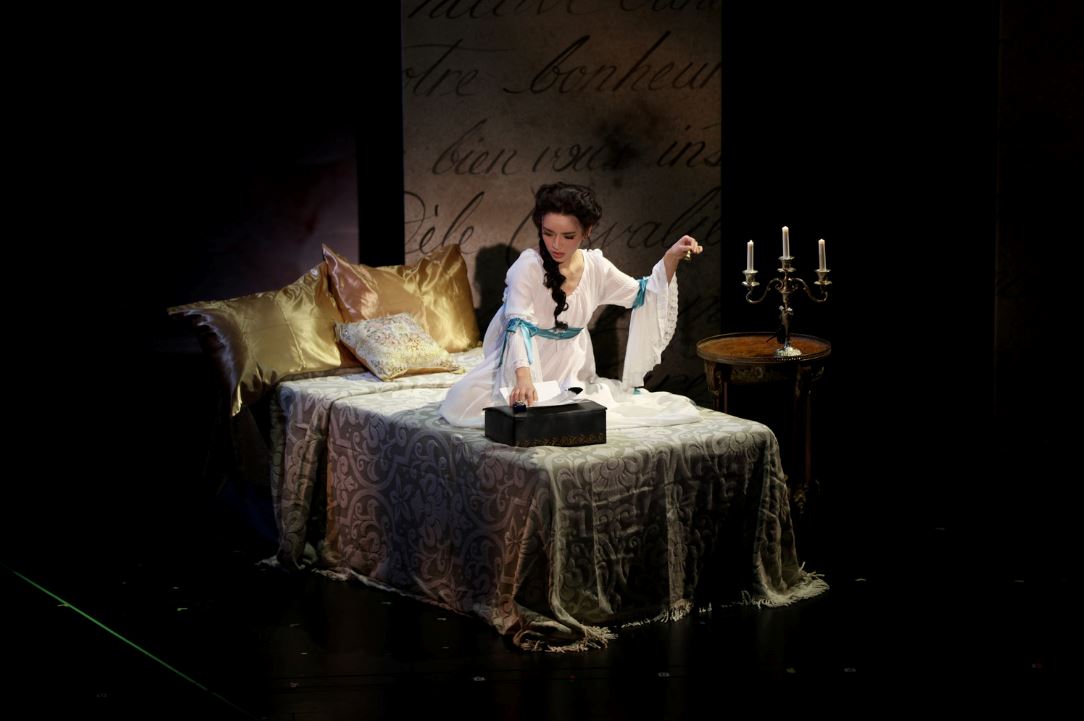By Andrew Hamlin
NORTHWEST ASIAN WEEKLY

Yeonji Lee, performing (Photo credit: Ashley Chui)
“I just love singing,” enthused Korean soprano Yeonji Lee, making her debut with Seattle Opera in the new production, “An American Dream.” “Singing makes me feel alive. Singing makes my heart beat. Particularly, I like singing because I’m using my whole body to create music.”
Ao Li, also making his Seattle Opera debut with “An American Dream,” had much the same to say about lifelong enthusiasm for singing. His parents, recalled the Chinese bass-baritone, did not play instruments, but loved to lift their voices.
“Chinese (Mandarin) pop music was the most powerful music when I was young,” remembers Li. “There is a Taiwan pop star whose name is Zhou Jielun (Jay Chou). He is my idol. I could sing almost all of his songs when I was in middle school.”
Yeonji Lee, unlike Li, actually began performing professionally as a child in her native Busan. She performed children’s songs in public, starting at age 5. Her first opera performance was in
Mozart’s “The Magic Flute,” playing the daughter of Papageno and Papagena.
Bass-baritone Li sang first in the tenor range, until his voice dropped around age 13. “My voice is very low and dark,” said Li. Losing his own higher range frustrated and saddened him until he heard Ferruccio Furlanetto, the famous Italian bass, singing in Mozart’s “The Marriage of Figaro.” He studied under Wei Fanjian at the Shandong Normal University Music College in Jinan City, Shandong Province.

Ao Li

Yeonji Lee
Yeonji Lee studied opera mostly in New York City’s Manhattan School of Music, where she earned both a bachelor’s and master’s degree. She credits Donna D. Vaughn, the school’s Artistic Director of Opera, for convincing her that she could sing opera. Another crucial teacher was the voice coach, actor, and singer Ron Raines.
“Learning how to sing is often really metaphysical, because you can’t see how muscles are working,” commented Lee on her work with Raines. “But he made me see what I couldn’t see. And I learned the way to find my own voice.”
“An American Dream,” written by composer Jack Perla with a libretto by Jessica Murphy Moo, unfolds in the Puget Sound against the background of the internment program forced on Japanese Americans during World War II. The action switches back and forth from a Japanese American lady forced to leave her home for a relocation camp, and a German Jewish lady, wondering and worrying about relatives left behind in Europe.
To portray the character of Makoto Kobayashi, Ao Li related, he had to learn some Japanese, a language he had not previously studied. He also had to stake out the emotional territory of a man who lives with fear, but struggles to hide that fear from his family.
For her character, Setsuko, Ms. Lee mused how “Setsuko is almost forced to become an adult in a very short period of time through multiple significant life events… Sadly, she had no choice but become an adult forcefully.”
“And I tried to depict her change, from child to grown-up, through the singing… And I hope we can cry together with Setsuko, remembering great survivors of that time.”
Neither singer is ethnically Japanese, yet both sing Japanese American characters. Ms. Lee opined, “Most times, the language of art is universal, so it does not necessarily need to be restricted on an artist’s ethnic background unless it is critically defined by composer/librettist. Personally, I believe I’m a Soprano first, before being an Asian female.”
“I like this beautiful city,” Ao Li concluded about Seattle. “I hope I can come back again soon.”
And Ms. Lee, who lives in Bellevue, looks forward to more trips across the 520 Floating Bridge.
“As an artist, Seattle is a good environment for me to focus on my artistry,” she finished. “I really love the scent of coming rain, it’s inspirational!” ■
“An American Dream” performance dates are Sept. 7, 8, 10, 14, 15, and 17. For more information or to buy tickets, visit seattleopera.org/on-stage/2017-american-dream.
Andrew can be reached at info@nwasianweekly.com.



